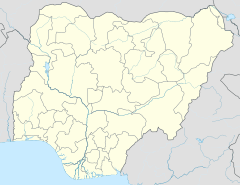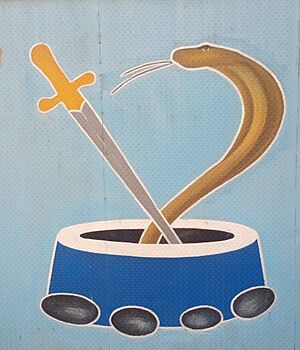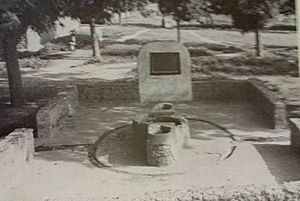Daura facts for kids
Quick facts for kids
Daura
|
|
|---|---|
|
LGA and Town
|
|
| Country | Nigeria |
| State | Katsina |
| Local Government Area | Daura |
| Elevation | 1,558 ft (474 m) |
| Time zone | UTC+1 (West Africa Time) |
| • Summer (DST) | UTC+1 (West Africa Time) |
Daura is an important town and a local government area in Katsina State, located in northern Nigeria. It is considered a very special place for the Hausa people, often called their "spiritual home."
Daura is known as one of the "seven true Hausa states" (also called Hausa Bakwai). This is because it was ruled by the children of Bayajidda and his wives, Daurama and Magira. The University of California has even called Daura and Katsina "ancient seats of Islamic culture and learning," meaning they were old and important centers for Islamic studies.
Contents
The Story of Daura
Daura is famous for a legend about a hero named Bayajidda. He was a figure from Hausa stories who traveled all the way across the Sahara Desert to reach Daura.
When he arrived, the people of Daura had a big problem: a giant snake named Sarki (which means "King") was stopping them from getting water from their well. Bayajidda bravely killed the snake. Because of his heroic act, the local queen, Magajiya Daurama, married him. One of their seven children was named Daura.
Today, the Kusugu Well in Daura, where Bayajidda is said to have fought the snake, is a popular tourist attraction. It is protected by a wooden shelter.
Daura's History Through the Years
In 1805, during a time of war called the Fulani War, a Fulani warrior named Malam Ishaku took control of Daura and started an emirate there. An emirate is like a kingdom ruled by an emir.
However, the Hausa people set up their own rival states nearby. Later, in 1904, when the British were in charge, they made Malam Musa, a ruler from one of these Hausa states, the new emir of Daura. This happened after the British and French divided the different Daura areas.
Daura was part of the North-Central state after 1967. Then, in 1976, it became part of Kaduna state. Finally, in 1987, it became part of the newly formed Katsina state.
Today, the Emir of Daura still rules as a traditional leader, even though his role is mostly ceremonial. He lives in a grand palace. Faruk Umar Faruk became the 60th Emir of Daura on February 28, 2007, after the previous emir passed away.
The Daura Emirate
The Daura Royal Palace, known as ‘Kangiwa’, is a very large building in the middle of the old city. It represents the rich culture, history, and traditions of the people of Daura.
The Daura Emirate is considered one of the "seven true Hausa states" (Hausa Bakwai). This means it was one of the original and most important Hausa kingdoms.
How People Make a Living in Daura
The economy in Daura mainly involves trading crops like sorghum, millet, onions, and peanuts. People also trade cotton, animal hides, and skins. Farmers in Daura raise cattle, goats, sheep, horses, and donkeys.
Making cotton cloth and collecting peanuts (which are then sent to other places) are important ways people earn money. Daura also has government health offices and clinics.
In the past, Daura was a major trading center for salt and potash from the Sahara Desert. It also traded cloth, leather, and farm products from the south. However, it was never as politically or militarily powerful as nearby cities like Katsina or Kano.
One special thing about Daura is that crops can be grown all year round. The government also encourages farming, which helps both large farms and small family farms.
Learning in Daura
Daura is a place with both formal schools and traditional learning. The education system follows the 6-3-3-4 pattern, which is used across Nigeria and many other West African countries. This means:
- 6 years of Primary school
- 3 years of Junior Secondary School (JSS)
- 3 years of Senior Secondary School (SSS)
- 4 years (or more) of university
All children are offered basic education, with a special focus on the first nine years. Daura has many primary schools, secondary schools, and colleges. These schools are run by either the government or private groups. Some of the higher learning institutions include the University of Transportation, Yusufu Bala Usman College, Sani Zango College of Health Technology, and Federal Polytechnic.
The Exciting Durbar Festival
The emir of Daura hosts a special event called a Durbar to celebrate two important Muslim festivals:
- Eid al-Fitr: This marks the end of the holy month of Ramadan.
- Eid al-Adha: This celebrates the Hajj (a holy pilgrimage).
The emir also holds a Durbar of Gani, which usually happens on the 12th day of Rabi' al-awwal, the third month in the Islamic calendar.
The Durbar is a grand parade of horsemen dressed in very fancy clothes. They ride through the city to the emir's palace. Once they gather near the palace, groups of horsemen, each representing a nearby village, take turns charging towards the emir. They stop just a few feet in front of the important guests to show their respect and loyalty.
Who Lives in Daura?
The largest ethnic group in Daura is the Hausa people. Sometimes, they are grouped together with the Fulani and called Hausa-Fulani.
Staying Healthy in Daura
Daura has many hospitals and medical centers. The healthcare system is divided into public (government-run) and private sectors. Both offer medical services at different levels. While private hospitals are often more expensive, they don't always provide better healthcare.
Daura's Size and People
In 1972, Daura's population was estimated to be about 25,151 people.
According to the MARA/ARMA organization, malaria is common in Daura for four to six months each year. In 2005, after an outbreak of measles in Katsina State, Daura became one of the places where workers were trained to give immunizations.
On license plates, Daura is often shortened to DRA.
Famous People from Daura
- Muhammadu Buhari: He was the military Head of State from 1983 to 1985 and has been the President of Nigeria since 2015.
- Faruk Umar Faruk: He is the current and 60th Emir of Daura.
- Sani Ahmed Daura: He was the first Governor of Yobe State from 1991 to 1998.
- Sani Zangon Daura: He served as the Minister of Agriculture and Rural Development from 1999 to 2000, and then as the Minister of Environment from 2000 to 2001.
- Ja'afar Mahmud Adam: A respected Islamic scholar.
- Salisu Buhari Daura: He was a former Speaker of the House of Representatives of Nigeria.
- Lawal Musa Daura: He was a former Director General of the Nigerian State Security Service.
- Mallam Mamman Daura: He was an editor for the New Nigerian newspaper (1969–1975) and Chairman of Nigerian Television Authority (1984–1985). He also served on the board of the Africa International Bank.
- Habu Daura: He was the Acting Governor of Bayelsa State from February to June 1997.
See also
 In Spanish: Daura para niños
In Spanish: Daura para niños
 | John T. Biggers |
 | Thomas Blackshear |
 | Mark Bradford |
 | Beverly Buchanan |




